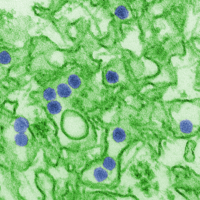
Photo from wikipedia
BACKGROUND Dengue is commonly considered an acute illness and follows three phases: febrile, critical in some cases and recovery. However, a number of studies have described a continuation of dengue… Click to show full abstract
BACKGROUND Dengue is commonly considered an acute illness and follows three phases: febrile, critical in some cases and recovery. However, a number of studies have described a continuation of dengue symptoms for weeks or months, extending the recovery phase. Here we evaluate this persistence of dengue symptoms during convalescence. METHODS Our clinical cohort study included patients who sought medical services 48 to 144 h from the onset of fever at seven hospitals or ambulatory centers in Morelos, Mexico. Seventy-nine laboratory-confirmed dengue patients were followed up regularly using clinic and/or home visits and telephone calls for as long as symptoms persisted or up to 6 mo. RESULTS In total, 55.7% of patients had dengue-related symptoms 1 mo after the onset of fever; pain and dermatological manifestations were the most common persistent symptoms. Prognostic factors for symptom persistence were: ≥4 d of fever (RR 1.72; 95% CI 1.35 to 2.19), platelet count ≤100 000/mm3 (RR 1.20; 95% CI 1.20 to 2.20), petechiae/bruises (RR 1.97; 95% CI 1.56 to 2.48) and abdominal pain/hepatomegaly (RR 1.79; 95% CI 1.41 to 2.28). CONCLUSIONS Persistence of dengue symptoms were common in laboratory-confirmed dengue patients. Manifestations related to tissue damage were associated with persistence after 30 d; host characteristics, such as age and health status before infection, were associated with prolonged persistence (>60 d). The burden of dengue may be higher than previously estimated.
Journal Title: Transactions of the Royal Society of Tropical Medicine and Hygiene
Year Published: 2020
Link to full text (if available)
Share on Social Media: Sign Up to like & get
recommendations!